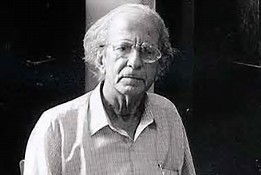Enterprise by Nissim Ezekiel is a powerful, multifaceted metaphor for a journey, an expedition, or a significant human enterprise, which a man dreams of, plans and concretizes but which ultimately ends in disillusionment. The poem becomes a testament of utopian ideas versus mundane matters of life woven into an apt metaphor of pilgrimage. From another perspective, as pointed out by L.S.R. Krishna Sastri, it becomes the poet’s pilgrimage “from sex to super-consciousness”.
The pilgrimage begins with so much excitement that the apprehended difficulties appear to be of little concern:
Exalting minds and making all
The burdens light.

With the second stanza, the momentum continues but the pilgrims begin to confront the adverse natural difficulties symbolized as the blazing sun. However, these obstacles only embolden them further as if to meet the challenge. Carried away by their unbridled excitement, the pilgrims minutely observe and note down everything to keep a record of the significant and insignificant. Thakur Guruprasad calls the poem, “a dramatization of how the enterprise at this stage braved all obstacles, and is an excellent little piece of satire on the urbanity’s adventure among rural and pastoral situations.” The reference to serpents emphasizes, rather ironically, how mentally ill-equipped the pilgrims are before they embark upon an expedition.
The poem begins to remind one of Eliot’s celebrated poem “The Journey of the Magi.” While in Eliot’s poem, there is a definite purpose and direction in the journey of the Magi, Ezikiel’s pilgrims in “Enterprise” are less privileged. However, both begin with the same spiritual energy, to be tested through obstacles that challenge their faith and solidarity.
It is in the third stanza that the poet writes of the rumbling which begins to show cracks in the façade of their unity: “But when the difference arose…”. It is also at this point that Ezekiel emphasizes the difference between a theorist and a practical man, a utopian programmer and a man of action. The theorist skilled in “stylish prose” is seen to be a failure to provide a workable solution to overcome the hurdle.
In the fourth stanza, the poet writes of other impediments in the way of expedition, such as outside assault and resultant loss of directions for the pilgrims. The debilitated leader tries to encourage the members by assuring that the destination is close. The act of praying at such a moment of helplessness implies seeking divine help because human efforts do not seem to suffice.
The grim colourless picture of the pilgrimage in the fifth stanza is diametrically opposed to the rosy one painted in the first two stanzas of the poem. Now, as a demoralized, disintegrated and exhausted lot, the pilgrims have their vision clouded so much that nothing remarkable is noticed by them anymore. While the surroundings turn into wasteland, the pilgrims turn into what Eliot would have called “hollow men”. They turn into a disorganized crowd of aimless wanderers, oblivious to their original motive. Their exalted aim degenerates into mere indulgence in trivial matters:
We noticed nothing as we went
A struggling crowd of little hope
The pilgrims ignore the meaning of “the thunder”, a symbol of illumination, related to man’s longing for a higher world. The entire enterprise is reduced to a motiveless ritualistic exercise.
In the last stanza, the pilgrims do reach the destination but in total disarray, disillusioned by the meaninglessness of the quest: “We hardly knew why we were there.” This is in sharp contrast to the satisfied, though stoical expression of Eliot’s Magi: “We were satisfied”. While balancing the difficulties and sufferings faced by the pilgrims against their eventual achievement, Ezekiel concludes that such an enterprise is utterly pointless. Such expeditions were undertaken in the past as well and is bound to be embarked upon in future too. This realization adds to the feeling of disillusionment. This is where Ezekiel’s realization distances itself from Eliot’s. After all, Ezekiel was writing at the postmodern age when the modern poet’s pessimism gains added emphasis.
The word “home” in the last line also refers to the poet’s city where life is full of kindred clamour. The theme of a quest for identity is developed through the extended metaphor of exploration which externalizes a personal problem and gives it universal validity.
The poem “Enterprise” can also be seen as the poet’s journey within self, to dive deep into his own psyche. This poem is a veritable study in group psychology. The frustration at the end is the modern man’s inability to know clearly about his aim and destination. At the same time, the poem shows that “grace” or redemption can be obtained through life, in the very act of living in the world. Without commitment to life in the world and without journeys into one’s own self, the metaphoric pilgrimage remains incomplete. It is also sometimes considered to be a commentary on the history of Indian poetry in English language, how it began with enthusiasm and got entrapped in the process of development. “Enterprise” charts the Indian poets’ anxiety of influence and the constant urge of establishing an independent identity.
Written in a conventional form, of six stanzas (all with similar rhyme scheme: ababa), “Enterprise” becomes a deceptively simple presentation of a deep spiritual question. The terse colloquial idiom is epigrammatic, and a balance is achieved by verbal antithesis and juxtaposition. The poem is a fine balance of poetic inspiration and technique, a beautiful presentation of a grand vision planted on dusty soil.
Additional Reading
Paradise Lost: Significance of the Invocation
John Milton, in his attempt to create an epic presentation of practically the whole act of creation and transgression of...
Read MoreKubla Khan by Coleridge : A Fragment or A Coherent Whole
Kubla Khan by Coleridge records an opium-induced dream, interrupted by a visitor from Porlock. The poem has been taken to...
Read MorePorphyria’s Lover by Robert Browning as a Dramatic Monologue
Porphyria’s Lover by Robert Browning is an extraordinary poem in the form of a dramatic monologue. The poetry of Robert...
Read More







Thank u ma’am for the write up…